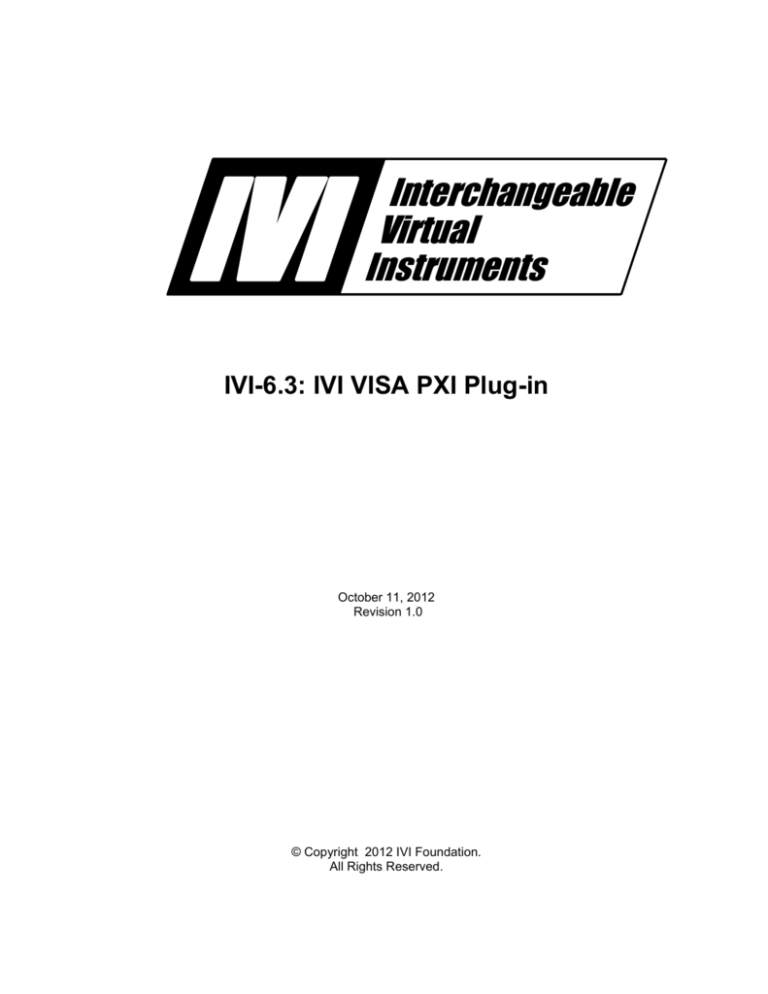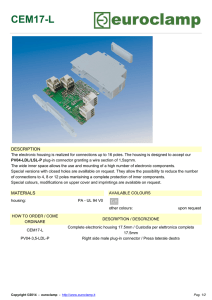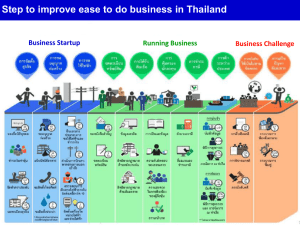
IVI
Interchangeable
Virtual
Instruments
IVI-6.3: IVI VISA PXI Plug-in
October 11, 2012
Revision 1.0
© Copyright 2012 IVI Foundation.
All Rights Reserved.
Important Information
The IVI-6.3: IVI VISA PXI Plug-in Specification is authored by the IVI Foundation member companies.
For a vendor membership roster list, please visit the IVI Foundation web site at
www.ivifoundation.org.
The IVI Foundation wants to receive your comments on this specification. You can contact the Foundation
through the web site at www.ivifoundation.org.
Warranty
The IVI Foundation and its member companies make no warranty of any kind with regard to this material,
including, but not limited to, the implied warranties of merchantability and fitness for a particular purpose.
The IVI Foundation and its member companies shall not be liable for errors contained herein or for
incidental or consequential damages in connection with the furnishing, performance, or use of this material.
Trademarks
Product and company names listed are trademarks or trade names of their respective companies.
No investigation has been made of common-law trademark rights in any work.
IVI-6.3:VISA PXI Plug-In Specification
2
IVI Foundation
1
Overview of the IVI VISA PXI Plug-in Specification ....................... 5
1.1
1.2
1.3
2
PXI Plug-in Requirements ............................................................... 9
2.1
2.2
2.3
3
Identification of a PXI Plug-in ........................................................................................................ 10
VISA Behavior When Multiple Plug-ins Support the Same Module .............................................. 11
VISA PXI Plug-in API .................................................................................................................... 12
API Definition ................................................................................. 13
3.1
3.2
3.3
3.4
3.5
3.6
3.7
3.8
3.9
3.10
3.11
3.12
3.13
3.14
3.15
4
IVI VISA PXI Plug-in Overview ...................................................................................................... 6
References ......................................................................................................................................... 7
Definitions of Terms and Acronyms ................................................................................................. 8
PpiInitializePlugin ........................................................................................................................... 14
PpiGetDeviceIDs ............................................................................................................................ 15
PpiOpen .......................................................................................................................................... 16
PpiGetSpaceInfo ............................................................................................................................. 17
PpiGetDeviceAttribute .................................................................................................................... 18
PpiMapMemory .............................................................................................................................. 19
PpiUnmapMemory .......................................................................................................................... 20
PpiBlockWrite................................................................................................................................. 21
PpiBlockRead ................................................................................................................................. 22
PpiEnableInterrupts ......................................................................................................................... 23
PpiWaitInterrupt ............................................................................................................................. 24
PpiDisableAndAbortWaitInterrupt ................................................................................................. 25
PpiTerminateIO ............................................................................................................................... 26
PpiClose .......................................................................................................................................... 27
PpiFinalizePlugin ............................................................................................................................ 28
Data types in include file ............................................................... 29
IVI-6.1: IVI High-Speed LAN Instrument Protocol
3
IVI Foundation
IVI VISA PXI Plug-in Revision History
This section is an overview of the revision history of the IVI VISA PXI Plug-in specification.
Table 1. IVI VISA PXI Plug-in Class Specification Revisions
Status
Revision 1.0
Description
First version of specification.
IVI-6.3:VISA PXI Plug-In Specification
4
IVI Foundation
1 Overview of the IVI VISA PXI Plug-in Specification
The IVI VISA plug-in provides a mechanism for various VISA libraries to access custom I/O software for devices that
use PXI I/O. The plug-in provides a user-level call that that presumably in turn calls a corresponding kernel driver that
has been configured by the operating system based on the hardware installed to interface with the hardware.
Figure 1, VISA PXI Plug-in mechanism, shows conceptually how the VISA PXI plug-in fits into the I/O architecture.
Client Application
VISA API per
VPP4.3.2
VISA Library
VISA PXI Plug-in API
per this specification
Registry
VISA PXI Plug-in
Vendor specific kernel
interface
Kernel Driver
Figure 1 VISA PXI Plug-in mechanism provides standard access to vendor specific kernel drivers
IVI-6.3:VISA PXI Plug-In Specification
5
IVI Foundation
1.1
IVI VISA PXI Plug-in Overview
When a client application calls VISA to find PXI resources or open a PXI session, VISA consults the registry to locate
PXI plug-ins. VISA dynamically loads the plug-ins and initializes them, finding the correct plug-in for a device by
getting the list of devices found by each plug-in. VISA completes all subsequent I/O to the device using the functions
defined in this document. If no plug-in is found, the VISA library may use vendor specific techniques to complete the
I/O operations or return an error from the call.
IVI-6.3:VISA PXI Plug-In Specification
6
IVI Foundation
1.2
References
Several other documents and specifications are related to this specification. These other related documents are the
following:
Microsoft
Microsoft Platform SDKs for Windows operating systems
Microsoft DDKs for Windows operating systems
IVI Foundation (www.ivifoundation.org)
VPP-4.3 & 4.3.x, The VISA Library and detailed VISA and VISA-COM specifications
PXISA (www.pxisa.org)
PXI-4, PXI Module Description File Specification
IVI-6.3:VISA PXI Plug-In Specification
7
IVI Foundation
1.3
Definitions of Terms and Acronyms
This section defines terms and acronyms that are specific to the VISA PXI Plug-in definition:
API
IVI-6.3:VISA PXI Plug-In Specification
Application Programmers Interface. The direct interface that an end
user sees when creating an application. The VISA API consists of the
sum of all of the operations, attributes, and events of each of the VISA
Resource Classes.
8
IVI Foundation
2 PXI Plug-in Requirements
The following sections have general PXI Plug-in requirements.
IVI-6.3:VISA PXI Plug-In Specification
9
IVI Foundation
2.1
Identification of a PXI Plug-in
This section describes how a client determines the appropriate plug-in to call for a given PXI device.
Devices provide a plug-in by specifying the plug-in DLL in the registry. To aid in the organization of the registry, the
vendor name is included, however that does not necessarily affect the behavior of the client.
The registry default OS bitness key is located at:
HKLM\
Software\
IVI\
VisaPxiPlugin\
<PlugInName>\
Modules that support 64-bit systems SHALL also provide 32-bit DLL’s. On 64-bit systems, the 32-bit registry entry
SHALL be:
HKLM\
Wow6432Node\
Software\
IVI\
VisaPxiPlugin\
<PlugInName>\
The PlugInName key SHALL include the vendor name, concatenated with a plug-in-specific string to make the
PlugInName unique.
The required registry values to write to this key are listed in Table 2, VISA PXI Plug-in registry entries.
Table 2 VISA PXI Plug-in registry entries
Registry Entry
Library
SpecVersion
IVI-6.3:VISA PXI Plug-In Specification
Type
String
String
10
Content
Full path of the DLL
Version of this specification to which the DLL
complies, in the format “major.minor”. Currently this
SHALL be “1.0”.
IVI Foundation
2.2
VISA Behavior When Multiple Plug-ins Support the Same Module
Multiple plug-ins may return information about the same module, this is normal behavior. The following define the
appropriate behavior for the plug-in client (which is nominally VISA):
If a single plug-in returns that it is the primary plug-in, the client should use it.
If no plug-in returns that it is the primary plug-in, but several plug-ins support a module, the client is
permitted to use a vendor specific algorithm to choose one.
If multiple plug-ins return that they are primary, the client is permitted to use a vendor specific algorithm to
choose one or flag an error.
IVI-6.3:VISA PXI Plug-In Specification
11
IVI Foundation
2.3
VISA PXI Plug-in API
The PXI Plug-in API SHALL implement all of the functions as defined below.
The DLL function calls are all defined as stdcall for Windows 32-bit.
IVI-6.3:VISA PXI Plug-In Specification
12
IVI Foundation
3 API Definition
The following sections define the required API.
IVI-6.3:VISA PXI Plug-In Specification
13
IVI Foundation
3.1
PpiInitializePlugin
A client should call this plug-in function first, for example, immediately after loading the plug-in. A plug-in
SHALL implement this by doing whatever one-time (per-process) initialization is needed. Since a plug-in
may be loaded by multiple clients in the same process, it SHALL reference count how many times this
function has been called, so it does not prematurely clean up when PpiFinalizePlugin() is called. In
particular, the plug-in SHALL NOT do any work on any calls to PpiInitializePlugin() except the first one.
If a plug-in returns an error from this function, a client should not make any further calls to that plug-in.
If a client does not call this function, the behavior is undefined. The plug-in is permitted to either return an
error from other functions or perform its one-time (per-process) initialization lazily.
ViStatus PpiInitializePlugin();
Parameters
None.
Return Value
If the operation completes successfully, the return value is VI_SUCCESS.
If the operation fails the return value is less than zero (VI_SUCCESS). If the operation fails an appropriate VISA error
code is returned.
IVI-6.3:VISA PXI Plug-In Specification
14
IVI Foundation
3.2
PpiGetDeviceIDs
Get the PCI device information for the devices supported by this DLL that have been enumerated by the OS.
A plug-in SHALL do whatever is necessary to ensure any cache is up-to-date, so the results of this call are always valid
at the time the call is made. For example, if a configuration file was updated in another process, it SHALL re-initialize
its state information to prevent it from returning invalid data. Calling this function must not invalidate any existing
session handles, even if the device to which that handle refers is no longer returned by this function.
If called with includeNonPrimary as VI_TRUE, it is possible for the same device to be returned from multiple plug-ins.
Not more than 1 plug-in should ever return isPrimaryArray[] of VI_TRUE for a given device; otherwise, system
behavior and reproducibility are not defined.
ViStatus PpiGetDeviceIDs(
__in
ViBoolean
__in
ViInt32
__in, out
ViAUInt64
__in, out
ViABoolean
__out
ViPInt32
);
includeNonPrimary,
arrayElementCount,
deviceIdArray,
isPrimaryArray,
deviceCount
Parameters
includeNonPrimary[in]
Whether the caller is interested in getting back information about devices for
which this plug-in is not the actual driver.
arrayElementCount [in] The maximum number of PpiDevInfo elements in the user-allocated array.
deviceIdArray [in, out]
A user-allocated array for holding the device IDs. For each element in the
array:
Fourth Word (most sig) Interface
Third Word
Bus Number
Second Word
PCI Device Number
First Word (least sig)
PCI Function Number
isPrimaryArray[in, out]
For each device returned in deviceIdArray, this specifies whether this plug-in
is the actual driver for it; can be NULL if includeNonPrimary is VI_FALSE.
deviceCount [in, out]
The count of device IDs detected by this plug-in.
Return Value
If the operation completes successfully, the return value is VI_SUCCESS.
If the operation fails the return value is less than zero (VI_SUCCESS). If the operation fails an appropriate
VISA error code is returned.
If the plug-in finds more devices than arrayElementCount, it must return VI_ERROR_INV_LENGTH and set
the number of devices actually found in the deviceCount output parameter. The plug-in SHALL NOT write
any values to the deviceIdArray or isPrimaryArray outputs in this case.
IVI-6.3:VISA PXI Plug-In Specification
15
IVI Foundation
3.3
PpiOpen
Open a handle to a modular instrument. The combination of intfc, bus, device, and function uniquely identify the
modular instrument.
A plug-in SHALL do whatever is necessary to ensure any cache is up-to-date, so the results of this call are always valid
at the time the call is made. This does not necessarily mean that the plug-in must always re-initialize the cache even if a
configuration file was updated in another process; as long as the device existed before in the cache and still exists, then
as long as the plug-in can access it, this function can succeed. For example, if a plug-in supports hot-swap devices, it
must be able to access a device that was plugged in after the cache was initially established. But across multiple calls to
this function where the configuration does not change, it is reasonable to not update the cache unnecessarily, for
performance reasons.
ViStatus PpiOpen(
__in
ViInt32
__in
ViInt32
__in
ViInt32
__in
ViInt32
__out
PpiHandle*
);
intfc,
bus,
device,
function,
handle
Parameters
intfc [in]
This is the 0-based PCI/PCIe interface # for the device.
bus [in]
Bus number for the device.
device [in]
Device number for the device.
function [in]
Function number for the device.
handle [in, out]
A pointer to the handle to be returned. If the function succeeds, *handle is a
session handle to the device to be used in VISA PXI Plug-in API calls. If the
function fails, the plug-in SHALL ensure *handle = 0.
Return Value
If the operation completes successfully, the return value is VI_SUCCESS.
If the operation fails the return value is less than zero (VI_SUCCESS). If the operation fails an appropriate
VISA error code is returned.
IVI-6.3:VISA PXI Plug-In Specification
16
IVI Foundation
3.4
PpiGetSpaceInfo
Get the PCI device information for the device corresponding to this handle.
If called for a space not used by this device, the implementation SHALL set the three output parameters to 0 and return
VI_SUCCESS. If the space does not correspond to a valid BAR index (for example, the configuration space) then an
error SHALL be returned.
ViStatus PpiGetSpaceInfo(
__in
PpiHandle
__in
PpiSpace
__out
ViPInt16
__out
ViPUInt64
__out
ViPUInt64
);
handle,
space,
spaceType,
spaceBase,
spaceSize
Parameters
handle [in]
Handle to the modular device, returned from PpiOpen().
space [in]
The space on the device for which to read information.
spaceType
The type of this BAR space using values as follows:
0
None
1
Memory
2
I/O
spaceBase
The base address for the designated BAR.
spaceSize
The size in bytes of the region of memory assigned to this BAR.
Return Value
If the operation completes successfully, the return value is VI_SUCCESS.
If the operation fails the return value is less than zero (VI_SUCCESS). If the operation fails an appropriate
VISA error code is returned.
IVI-6.3:VISA PXI Plug-In Specification
17
IVI Foundation
3.5
PpiGetDeviceAttribute
Get the specified information (such as Manufacturer and Model) for the device corresponding to this handle.
A plug-in is required to implement the following VISA attributes :
VI_ATTR_MANF_ID
ViUInt16
VI_ATTR_MODEL_CODE
ViUInt16
VI_ATTR_MANF_NAME
ViChar [256]
VI_ATTR_MODEL_NAME
ViChar [256]
VI_ATTR_PXI_ALLOW_WRITE_COMBINE
ViBoolean
VI_ATTR_DMA_ALLOW_EN
ViBoolean
A plug-in may optionally implement the following VISA attributes :
VI_ATTR_PXI_SLOTPATH
ViChar [256]
A plug-in is allowed to implement additional VISA attributes, such as vendor-specific attributes.
If the property VI_ATTR_PXI_ALLOW_WRITE_COMBINE or VI_ATTR_DMA_ALLOW_EN is queried, the
plug-in SHALLreturn whether enabling write combining or DMA, respectively, is supported.
Any properties declared as optional are things a client could easily get elsewhere, such as from pxi*sys.ini. If a plug-in
returns an error instead of implementing optional properties, the client is responsible for handling this appropriately.
ViStatus PpiGetDeviceAttribute(
__in
PpiHandle handle,
__in
ViAttr
attributeID,
__out
void *
attributeValue
);
Parameters
handle [in]
Handle to the modular device, returned from PpiOpen().
attributeID [in]
VISA-defined or vendor-specific attribute ID.
attributeValue [out] Value of the requested attribute, on success. The type of data that this
parameter points to depends on the attribute ID. The caller is responsible for
passing a buffer large enough to contain the attribute value.
Return Value
If the operation completes successfully, the return value is VI_SUCCESS.
If the operation fails the return value is less than zero (VI_SUCCESS). If the operation fails an appropriate
VISA error code is returned.
IVI-6.3:VISA PXI Plug-In Specification
18
IVI Foundation
3.6
PpiMapMemory
Map base address register memory on a PCIe device into user space and make it available to the calling process.
ViStatus PpiMapMemory (
__in
PpiHandle
__in
PpiSpace
__in
ViUInt64
__in
PpiLength
__out
void **
);
handle,
space,
offset,
length,
userSpaceMem
Parameters
handle [in]
Handle to the modular instrument, returned from PpiOpen().
space [in]
The base address register to map. PpiSpace is an enum type. Note that PCI
config space and I/O space cannot be mapped using this method.
offset [in]
The offset in bytes within the base address register to begin to map.
length [in]
The number of bytes to map. This is either a 32 bit value or a 64-bit value,
depending on the application.
userSpaceMem [out] A pointer (virtual address) to the mapped memory, available to the calling
process. If the function fails, *userSpaceMem is 0x0.
Return Value
If the operation completes successfully, the return value is VI_SUCCESS.
If the operation fails the return value is less than zero (VI_SUCCESS). If the operation fails an appropriate
VISA error code is returned.
IVI-6.3:VISA PXI Plug-In Specification
19
IVI Foundation
3.7
PpiUnmapMemory
Unmap previously mapped memory. Note that if the implementation requires the BAR, offset, or length to Unmap, it
should be saved when the PpiMapMemory is done.
ViStatus PpiUnmapMemory (
__in
PpiHandle
__in
ViAddr
);
handle,
userSpaceMem
Parameters
handle [in]
userSpaceMem [in]
Handle to the modular device, returned from PpiOpen().
A pointer to the mapped memory to unmap.
Return Value
If the operation completes successfully, the return value is VI_SUCCESS.
If the operation fails the return value is less than zero (VI_SUCCESS). If the operation fails an appropriate
VISA error code is returned.
IVI-6.3:VISA PXI Plug-In Specification
20
IVI Foundation
3.8
PpiBlockWrite
Write a block of memory to a device.
If the address space is configuration space, and the offset points to a register that is managed by the operating system
and/or BIOS such that it is potentially unsafe to change its value, the implementation is allowed to return an error. For
example, the registers at offsets 0-63 are typically managed by the operation system and/or BIOS.
ViStatus PpiBlockWrite (
__in
PpiHandle
__in
ViInt32
__in
PpiSpace
__in
ViUInt64
__in
ViUInt32
__in
ViBoolean
__in
void *
__in
PpiLength
__in
ViUInt32
);
handle,
flags,
space,
offset,
width,
increment,
writeBuffer,
count,
timeoutMilliseconds
Parameters
handle [in]
flags [in]
Handle to the modular device, returned from PpiOpen().
Flags to control write behaviors. These flags are used as hints, and may be
ignored if the device being accessed does not support the mode. A plug-in
SHALL ignore any bit that it does not recognize. It may flag an error for nonsensical combinations. The most significant 16 bits are reserved for vendor
definition. Bits defined:
#define USE_DMA
#define USE_WRITE_COMBINE
0x1
0x2
space[in]
The space on the device to which to write.
offset [in]
A byte offset within space.
width[in]
Transfer width in bytes. Possible values are 1, 2, 4, and 8.
increment [in]
If true, increments the destination address by width between each individual
write.
writeBuffer [in]
Pointer to the data to write.
count[in]
Number of elements of width size to write.
timeoutMilliseconds[in] The amount of time to wait for the function to complete. 0xFFFFFFFF
indicates infinity.
Return Value
If the operation completes successfully, the return value is VI_SUCCESS.
If the operation fails the return value is nonzero (not VI_SUCCESS). If the operation fails an appropriate
VISA error code is returned.
IVI-6.3:VISA PXI Plug-In Specification
21
IVI Foundation
3.9
PpiBlockRead
Read a block of memory from a device.
ViStatus PpiBlockRead (
__in
PpiHandle
__in
ViInt32
__in
PpiSpace
__in
ViUInt64
__in
ViUInt32
__in
ViBoolean
__in, out
void *
__in
PpiLength
__in
ViUInt32
);
handle,
flags,
space,
offset,
width,
increment,
readBuffer,
count,
timeoutMilliseconds
Parameters
handle [in]
Handle to the modular device, returned from PpiOpen().
flags [in]
Flags to control read behaviors. These flags are to be used as hints, and may be
ignored if the device being accessed does not support the mode. A plug-in
SHALL ignore any bit that it does not recognize. It may flag an error for nonsensical combinations. The most significant 16 bits are reserved for vendor
definition. See flags documented in PpiBlockWrite.
space [in]
The space on the device from which to read.
offset [in]
A byte offset within space.
width[in]
Transfer width in bytes. Possible values are 1, 2, 4, and 8.
increment [in]
If true, increments the source address by width between each individual read.
readBuffer [in, out] Pointer to a user-allocated buffer that will receive the data.
count[in]
Number of elements of width size to read.
timeoutMilliseconds [in] The amount of time to wait for the function to complete. 0xFFFFFFFF
indicates infinity.
Return Value
If the operation completes successfully, the return value is VI_SUCCESS.
If the operation fails the return value is less than zero (VI_SUCCESS). If the operation fails an appropriate
VISA error code is returned.
IVI-6.3:VISA PXI Plug-In Specification
22
IVI Foundation
3.10 PpiEnableInterrupts
Enables the client to receive interrupts from this device.
The client should call PpiEnableInterrupts before calling PpiWaitInterrupt. If an interrupt occurs after calling
PpiEnableInterrupts, but before PpiWaitInterrupt is called, that PpiWaitInterupt will return without having to wait.
The specification does not specify whether any interrupts occurring before PpiEnableInterrupts are buffered or
ignored. If there are any existing buffered interrupts, this function does not flush them.
PXI-4 (PXI Module DescriptionFile Specification) Section 2.4, defines an interrupt enable sequence that is placed in
the peripheral description file. If no interrupt enable sequence is defined, this call may generate an error.
ViStatus PpiEnableInterrupts (
__in
PpiHandle handle,
__in
ViUInt16
queueLength
);
Parameters
handle [in]
Handle to the modular device, returned from PpiOpen().
queueLength [in]
The number of interrupts a plug-in must be able to buffer.
Return Value
If the operation completes successfully, the return value is VI_SUCCESS.
If interrupts are already enabled because the caller has previously called PpiEnableInterrupts on this session,
the return value is VI_SUCCESS_EVENT_EN.
If the operation fails the return value is less than zero (VI_SUCCESS). If the operation fails an appropriate
VISA error code is returned.
IVI-6.3:VISA PXI Plug-In Specification
23
IVI Foundation
3.11 PpiWaitInterrupt
If there is at least one buffered interrupt on this session, regardless of whether interrupts are currently enabled, this
function SHALL return immediately with success.
Otherwise, if interrupts are already enabled by PpiEnableInterrupts, block this thread until an interrupt occurs. Note
that interrupts are initially disabled.
See PpiEnableInterrupts for additional information about how this is configured.
PpiWaitInterrupt may be called with a timeoutMilliseconds of zero to discard a single buffered interrupt. Calling it
successively until a timeout error occurs will clear all queued interrupts.
If interrupts are not enabled (meaning PpiEnableInterrupts has not been called), this function SHALL return
immediately rather than waiting the specified timeout. The return value (success or error) in this case depends on
whether there are any buffered interrupts.
Does not return until either:
A general purpose (non data transfer) PCIe interrupt arrives from the device. This returns VI_SUCCESS.
The specified timeout has elapsed. This returns VI_ERROR_TMO.
A PpiDisableAndAbortWaitInterrupt is called. This returns VI_ERROR_ABORT.
PpiClose is called. The return value is an error but is not required to be a specific value.
ViStatus PpiWaitInterrupt (
__in
PpiHandle handle,
__in
ViUInt32
timeoutMilliseconds,
__out
ViPInt16
interruptSequence,
__out
ViPUInt32 interruptData
);
Parameters
handle [in]
Handle to the modular device, returned from PpiOpen().
timeoutMilliseconds [in] The amount of time to wait for the function to complete. 0xFFFFFFFF
indicates infinity.
interruptSequence [out] The index of the interrupt sequence (defined in PXI-4) that detected the
interrupt condition. Driver not based on PXI-4 are permitted to return an
arbitrary value indicating the reason for the interrupt. VISA provides this value to
the client in the VI_ATTR_PXI_RECV_INTR_SEQ attribute on the event context.
interruptData[out]
The interrupt detection sequence (defined in PXI-4) may include a read. This
interrupt data is the value from the first successful read. Drivers not based on
PXI-4 are permitted to return an arbitrary value to the VISA client using this.
VISA provides this value to the client in the VI_ATTR_PXI_RECV_INTR_DATA
attribute on the event context.
Return Value
If the operation completes successfully, the return value is VI_SUCCESS.
If interrupts are disabled and there are no buffered interrupts, the return value is VI_ERROR_NENABLED.
If the operation fails the return value is less than zero (VI_SUCCESS). If the operation fails an appropriate
VISA error code is returned.
IVI-6.3:VISA PXI Plug-In Specification
24
IVI Foundation
3.12 PpiDisableAndAbortWaitInterrupt
Unblocks a PpiWaitInterrupt call. After calling this function, clients should not call PpiWaitInterrupt without first
calling PpiEnableInterrupts again.
This specification does not specify whether any interrupts occuring after PpiDisableAndAbortWaitInterrupt are
buffered or ignored.
ViStatus PpiDisableAndAbortWaitInterrupt (
__in
PpiHandle handle
);
Parameters
handle [in]
Handle to the modular device, returned from PpiOpen().
Return Value
If the operation completes successfully, the return value is VI_SUCCESS.
If the operation fails the return value is less than zero (VI_SUCCESS). If the operation fails an appropriate
VISA error code is returned.
IVI-6.3:VISA PXI Plug-In Specification
25
IVI Foundation
3.13 PpiTerminateIO
Abort a block I/O transfer that is running in the background. The plug-in is permitted to ignore this operation and wait
for the transfer to complete normally. The plug-in SHALL return VI_ERROR_NIMPL_OPER if the operation is
ignored.
ViStatus PpiTerminateIO (
__in
PpiHandle handle,
__in
void*
buffer
);
Parameters
handle [in]
Handle to the modular device, returned from PpiOpen().
buffer[in]
The buffer that the I/O was initiated on (readBuffer or writeBuffer).
Return Value
If the operation completes successfully, the return value is VI_SUCCESS.
If the operation fails the return value is less than zero (VI_SUCCESS). If the operation fails an appropriate
VISA error code is returned.
IVI-6.3:VISA PXI Plug-In Specification
26
IVI Foundation
3.14 PpiClose
Close the handle to a device. This will abort all pending I/O and unblock any threads waiting for an interrupt.
ViStatus PpiClose (
__in
PpiHandle handle
);
Parameters
handle [in]
Handle to the modular device, returned from PpiOpen().
Return Value
If the operation completes successfully, the return value is VI_SUCCESS.
If the operation fails the return value is less than zero (VI_SUCCESS). If the operation fails an appropriate
VISA error code is returned.
IVI-6.3:VISA PXI Plug-In Specification
27
IVI Foundation
3.15 PpiFinalizePlugin
A client should call this plug-in function last, for example, immediately before unloading the plug-in. A plugin should implement this by doing whatever one-time (per-process) cleanup is needed. Since a plug-in may be
loaded by multiple clients in the same process, it SHALL reference count how many times
PpiInitializePlugin() was called, so it does not prematurely clean up when this function is called. In particular,
the plug-in SHALL NOT do any work on any calls to PpiFinalizePlugin() except the last one.
ViStatus PpiFinalizePlugin();
Parameters
None.
Return Value
If the operation completes successfully, the return value is VI_SUCCESS.
If the operation fails the return value is less than zero (VI_SUCCESS). If the operation fails an appropriate VISA error
code is returned.
IVI-6.3:VISA PXI Plug-In Specification
28
IVI Foundation
4 Data types in include file
typedef ViBusSize
PpiLength;
typedef ViAddr
PpiHandle ;
typedef enum
{
Bar0 = 0,
Bar1,
Bar2,
Bar3,
Bar4,
Bar5,
Config
} PpiSpace;
IVI-6.3:VISA PXI Plug-In Specification
29
IVI Foundation








